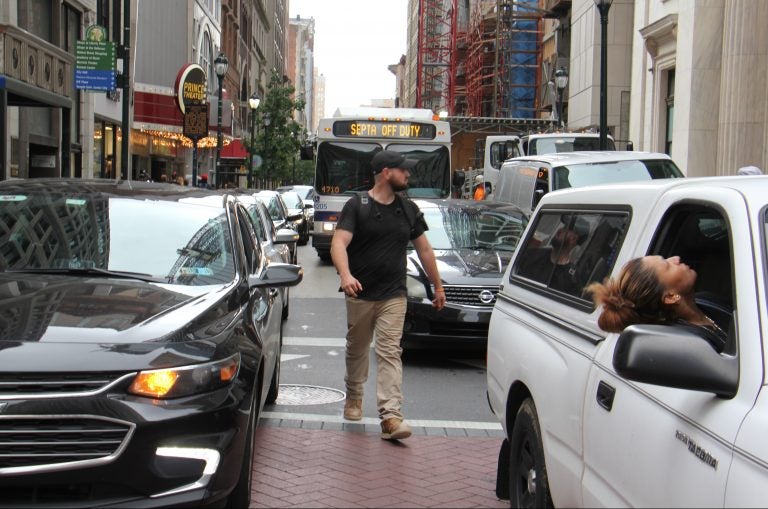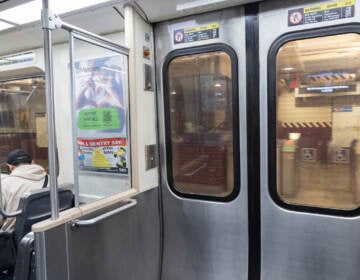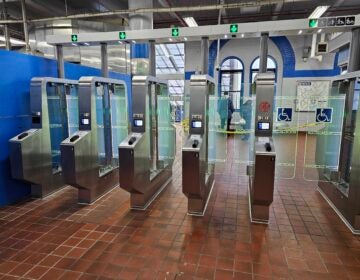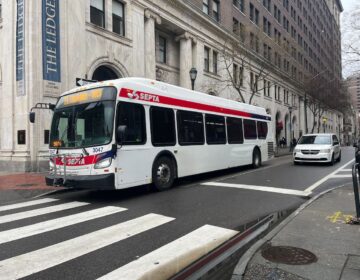Report: Congestion costs Philly $152 million a year
SEPTA makes “the economic case” for fighting congestion with increased parking enforcement and other measures.

A pedestrian threads his way through snarled traffic at Broad and Chestnut streets. (Emma Lee/WHYY)
This story originally appeared on PlanPhilly.
—
Philadelphia drivers have a reputation for road rage and SEPTA just gave them a new reason to be ticked off.
A new study commissioned by the transit agency found local households are paying a de-facto congestion tax of $260 a year. The unofficial tariff comes in the way of time and revenue lost to sitting in traffic, according to the study done by EConsult Solutions, a Philadelphia-based consulting firm.
EConsult studied the impact of clogged streets on SEPTA’s service and the city as a whole. The firm studied Center City, between Vine and South, from river to river, and found drivers and passengers experience 9.7 million hours in delays a year. This equates to a total loss of $152 million a year.
The agency describes the report as the “economic case” for fighting congestion with increased parking enforcement and other measures, including unarmed traffic safety officers.
The study shows only the “cost to SEPTA’s direct operating budget, but also…the cost to the overall economy,” said Erik Johanson, SEPTA’s director of innovation.
The report comes out less than a week after City Council held a bill that would have increased parking fines. The higher fines were intended to deter drivers from the bad habits that contribute to congestion.
The increased fines were opposed by council people who viewed them as an unfair toll on drivers.
Mike Carroll, the city’s deputy managing director for the Office of Transportation, Infrastructure, and Sustainability, says it’s important to acknowledge that congestion, too, has a price.
The study “really does confirm some hunches that people have had about the impacts of congestion,” he said.
The $152 million in lost productivity affects cars and buses, the latter of which experience higher delays. Cars experience an average delay of 28% between Monday and Friday while SEPTA buses experience an average delay of 77%—nearly three times more.
These delays, according to the report, cost SEPTA more than $15 million in additional operational and overhead costs.
Furthermore, the delays lead to slower service, causing many passengers to opt out.
Congestion delays result in 4.7 million lost trips. The reduction in fares costs $5.8 million, EConsult found, and puts even more cars on the road, perpetuating and deepening the cycle.
Congestion’s unequal burden
The report also argues congestion is an equity issue. Higher-income riders are more easily able to opt out of public transportation with private vehicles or ride shares, leaving lower-income riders to “bear the brunt of time losses.”
One third of Philadelphia households are without a private vehicle.
RIttenhouse Square, City Hall, and the bridges connecting Center City to University City experience the most severe delays, according to the report. These areas and conduits increase travel time by at least 30%.
Authors of the study don’t evaluate causes of congestion, but the city is focusing their counter-attack on curbside activity such as parking and loading.
This month, the city initiated a targeted parking enforcement crackdown on Chestnut Street between 7th and 23rd, and Market between 7th and 13th. The program will target bus, bike, and right-turn only lanes.
A previous iteration of the program yielded positive results, according to SEPTA. On Chestnut between the Schuylkill and the Delaware, bus times improved by 2.5 minutes per bus on average, on Market between City Hall and 7th, a 30-second improvement.
Market and Chestnut Streets are SEPTA’s most heavily used bus corridors, says Johanson.
WHYY is your source for fact-based, in-depth journalism and information. As a nonprofit organization, we rely on financial support from readers like you. Please give today.







